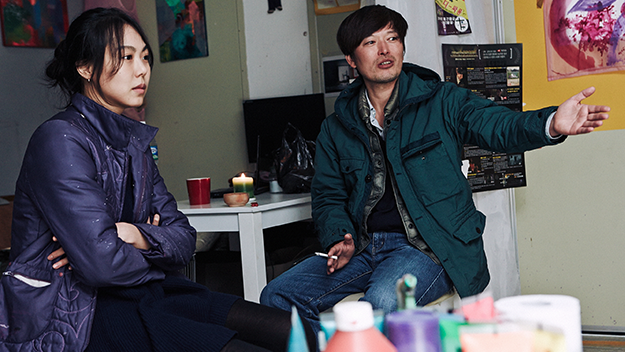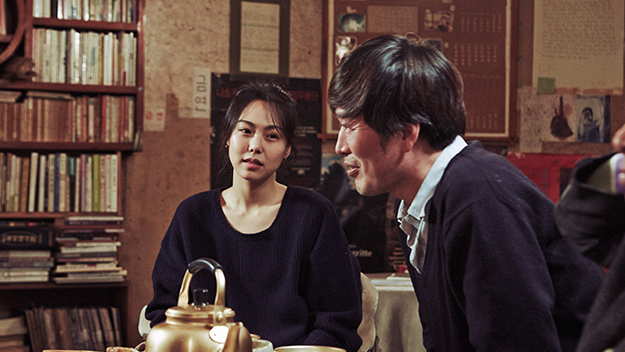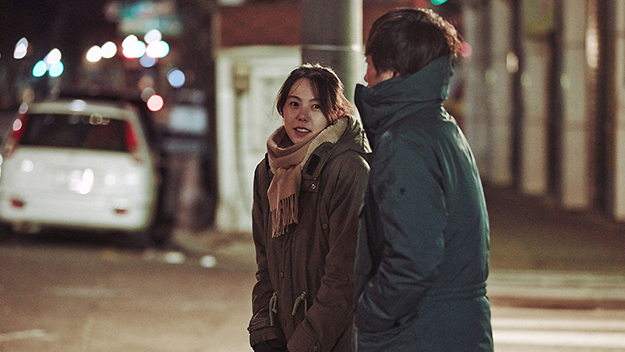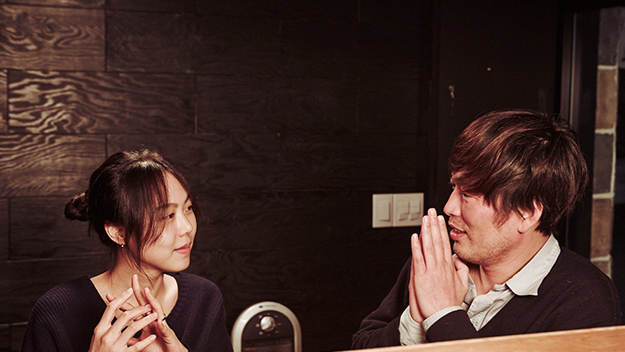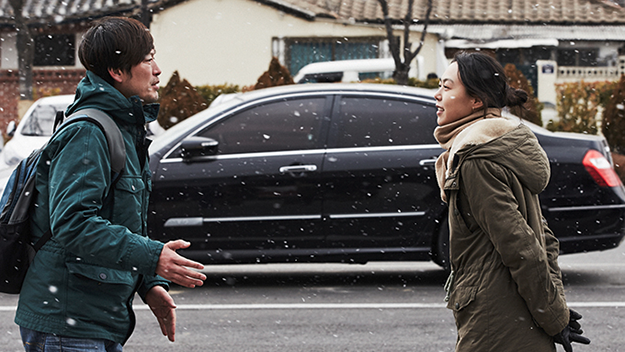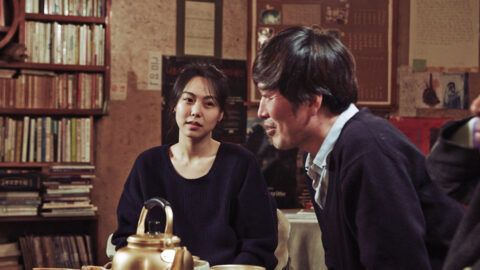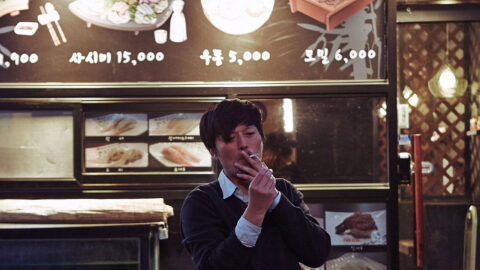Film of the Week: Right Now, Wrong Then
Among the many parody Downfall videos on YouTube, featuring Bruno Ganz’s Hitler ranting in subtitles about every subject under the sun, there’s one about prolific South Korean director Hong Sangsoo. He has offended the Führer by “making the same film for 10 years . . . with his crap photography. Does he even have a DoP? . . . Always the same navel-gazing universe—and the critics love it!” As with the best of these DIY spoofs, which startle us into realizing we actually agree with Hitler, there’s a valid point being made, if a somewhat obvious one. Hong is probably more notorious than any other contemporary director for making films that resemble each other, repeatedly telling similar stories with minor variations.
Not only that, he sometimes divides his films into separate segments which themselves resemble each other, or even duplicate each other in all but the fine points. I defy even the most hardcore Hong admirer to have crystal-clear memories of, say, Woman Is the Future of Man (04) or Ha ha ha (10). Some Hong films stand out in having a different location or some sort of conceptual twist—like Woman on the Beach (06), set by the sea rather than in a mundane urban setting, or Night and Day (08), about Korean expats in Paris. There’s the one starring Isabelle Huppert, In Another Country (12), which stands out distinctly as “the one starring Isabelle Huppert”—although since Hong has just completed another shoot with her, at the Cannes Film Festival, we may be confused again before long.
Even when particular films stand out for some particular reason, the stories themselves resemble each other. As often as not, overconfident men fall for seemingly gauche women but end up tripping over their own gaucheness, usually as a result of getting drunk on soju, then leave town with their tails between their legs, while, reversing expectations, the women emerge as the real protagonists.
At first sight, Hong’s Right Now, Wrong Then looks pretty familiar. It tells two stories, or the same one twice over: a film director visits an unfamiliar town, spends a day with a younger woman he meets, and possibly learns something about himself (or fails to). Along the way, he drinks too much soju and makes a fool of himself. This all sounds very close to Like You Know It All (09), a diptych about a director on a film festival jury, who similarly overestimates his soju threshold; the four-part Oki’s Movie (10), in which much the same happens; or indeed The Day He Arrives (11), Hong’s most complex and overtly self-referential film, in which temporal signposts disappear, finely tuned repetitions rule, and much of the action takes place in a bar named Novel.
There’s a café in Right Now, Wrong Then which could easily be called Novella. This film shows Hong in delicate miniature mode, and while we may think we’ve seen it all before, what’s distinctive is the musical delicacy with which he adjusts small but all-important inflections. The first time we see this story, in the film’s first part, a young woman mixes orangey-pinkish pigment for a painting she’s working on; in the second part, the paint is blue-green. The two halves of the film, you might say, are colored differently.
Both sections feature a youngish-verging-on-middle-aged film director named not Hong Sangsoo, but Ham Chunsu (Jung Jaeyoung, from Hong’s Our Sunhi)—which is near enough for comic discomfort. He’s visiting the town of Suwon to present one of his films, but has arrived a day early. The first person glimpsed in the first half—Right Then, Wrong Now [sic], reads the subtitle to the opening credits—is a young woman walking away from camera toward the historic Hwaseong Haenggung palace, but after a first glance, Chunsu forgets about her. He’s next seen gazing from his hotel window at another young woman, Bora (Ko Asung, from Bong Joonho’s Snowpiercer), his festival contact. He’s interested, but reminds himself, in a voiceover interior monologue, “Be careful. She’s too pretty.” Clearly, he has a habit of getting himself into situations with pretty, impressionable young women. If we think we’ve seen this one before, rest assured, so has Chunsu.
Casting caution aside—possibly because Bora tells him she’s mad about his films—Chunsu spends time with her at a sledding rink, but things don’t go further between them because his mind turns to other matters. Visiting the palace, he spots the woman from the opening shot, Heejung (played by the impish Kim Minhee, recently seen in Park Chanwook’s Cannes competition entry The Handmaiden). “She’s still here?” Chunsu thinks to himself, as if overtly commenting on the remarkable narrative convenience of this turn of affairs. He cautiously chats her up with some lame comments about the banana milk she’s sipping, then casually lets slip that he’s a film director. He’s got her interest—she has heard of him although she has never seen any of his films—and he begins to reel her in. Or perhaps she’s the one reeling him in.
They spend the rest of the day together, chatting at length in a café, visiting the studio where she paints, and inevitably, getting tipsy together in a sushi bar, where things get more personal between them. She enthuses that he’s a real man; he tells her she’s a real woman, the first he’s ever known. What are we witnessing here? Love? Lust? Or just lines? We don’t really know, yet we’re never far from seeing real emotions floating to the surface, and from seeing those emotions yield ironic comedy. For example, Heejung gets maudlin about being lonely and having no friends—then invites Chunsu to join her at a café where her friends are getting together.
It’s in the café scene that things begin to unravel between the couple, and her friends—clumsily, or with real aggression—start digging at Chunsu, causing an awkward truth to emerge. Here, Hong’s famous penchant for abrupt zooms—a love-it-or-hate-it idiosyncrasy that divides his audiences—comes into its own, and the uneasy look on Heejung’s face as she sits at center frame is one of the sublime pleasures of the film, where Hong’s delicacy of comic perception, and the precision of Kim’s performance, emerge beautifully.
Soon after, it all starts again—literally, as Hong re-runs the opening title card. Only this time, the subtitle reads Right Now, Wrong Then. Again, Heejung walks towards the palace, but this time there’s no Bora to distract Chunsu. What ensues is the same but different, but now (unless my attention strayed and is misleading me) there’s no voiceover—which makes you wonder whether Part Two is a provisional variation on previous events, or whether Part One was a story Chunsu was writing about real events seen in Part Two. However, as usual with such “either-or/both-and” narrative constructions, you can never be sure about the exact status of the events you’re viewing; neither version is any more real than the other.
Suffice to say that what went right, or right-ish, the last time goes wrong now, and vice versa. Instead of praising Heejung’s paintings, Ham gives a too-brusque criticism, denting her self-esteem. A gaffe, or a conscious, cynical seduction technique? Again, it’s hard to know. Either way, it doesn’t do too much damage. Again, the pair wind up drunk over their sushi, and this time, they’re not censoring themselves: Ham goes so far as to tell Heejung he’s in love and wants to marry her, then bursts out crying.
It’s only at this point in the film that it occurred to me that the couple may have already made love by this point, perhaps at Heejung’s studio, something that didn’t seem apparent or likely in Part One (this time, they’ve shared an additional moment of romantic intimacy, gazing at the city skyline from her studio roof). Other questions are mounting by this point. Does Chunsu get into this situation at every festival he attends? Who’s the man Heejung says (in Part One) that she sometimes meets, although he isn’t a friend—and why hasn’t she mentioned him this time? The scene with Heejun’s friends plays out again, but this time, she takes a snooze in the next room, thereby missing the film’s comic high point, a delicious moment of farcical awkwardness.
On this occasion, the end of the couple’s day proves oddly abrupt, derisory, on the order of happenstance: if you expected to see these characters embrace their romantic destiny to the accompaniment of a soaring Liebestod, forget it; this is a Hong film. The play on alternative realities in his films never makes heavy weather of the “forking paths” narrative trope of “if-x-then-y.” We’re miles away from Kieslowski’s Blind Chance or, God forbid, Sliding Doors. You never get the sense that events in a Hong film have substantial real-world repercussions for any of their characters, much as you can’t imagine anyone’s life ever being changed by seeing any of his films (except on the subtlest, most microscopic level of ironic sensibility). There’s a sweetly weary resignation to the idea of life going on, repeating itself incessantly, as people make the same mistakes over and over again, yet survive them by the skin of their teeth. The essential tone of his films could be described as “deep inconsequentiality”—and maybe there are some substantial insights to be had from their superficiality. One is the lesson that drunkenness is the truest form of honesty. Another is offered by Bora, who tells Chunsu in Part One that she’s a huge fan of his films, and says that she’s learned from them that “life’s not that bad.”
It’s perhaps not the deepest lesson, but it sounds as though, all things considered, it might be a valuable one. Hong Sangsoo’s films make us realize that people like Chunsu have the potential to make life pretty dreadful for themselves and everyone around them, so thank goodness for providence—and a master manipulator like Hong Sangsoo—for saving everyone from the brink.
Right Now, Wrong Then opens June 24.
Jonathan Romney is a contributing editor to FILM COMMENT and writes its Film of the Week column. He is a member of the London Film Critics Circle.



